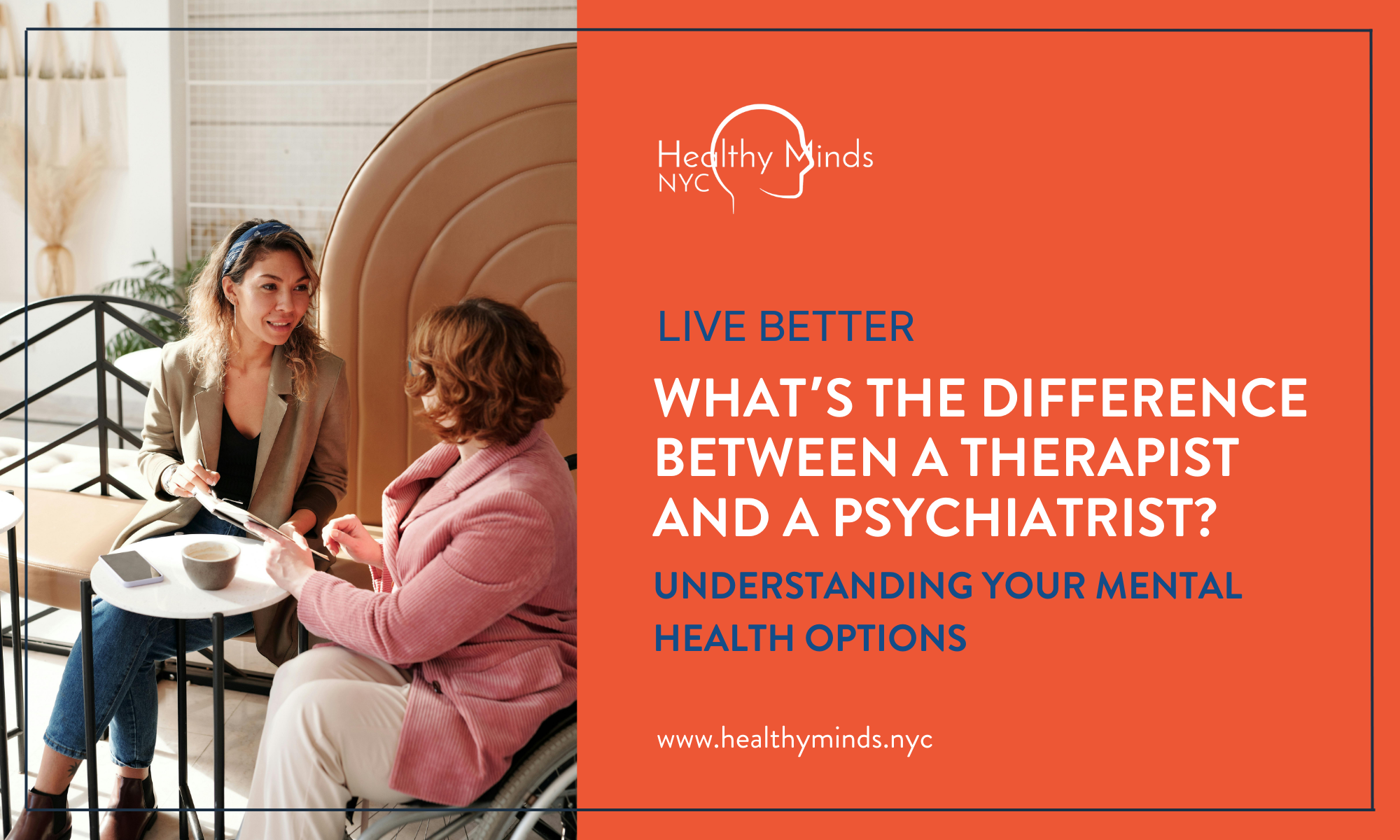What’s the Difference Between a Therapist and a Psychiatrist? Understanding Your Mental Health Options
When you're starting your mental health journey, one of the most common questions is: what’s the difference between a therapist and a psychiatrist? Both professionals play important roles in mental wellness, but their training, focus, and services are different. If you’re not sure where to begin—or whether you need therapy, medication, or both—you’re not alone. This guide breaks it down in a simple, supportive way so you can feel more confident about your next step.
IS IT BETTER TO SEE A THERAPIST OR PSYCHIATRIST?
Whether it’s better to see a therapist or a psychiatrist depends on what kind of support you’re looking for. If you're going through a hard time emotionally, want to explore patterns in your relationships, or just need a safe place to talk through what you're feeling, a therapist may be the best place to start. Therapists focus on talk therapy, helping you process emotions, manage stress, and make meaningful changes over time.
On the other hand, if you’re experiencing more intense symptoms—like persistent mood swings, panic attacks, severe depression, or suspected signs of a mental health disorder—a psychiatrist might be helpful. Psychiatrists are medical doctors who can evaluate your symptoms and prescribe medications if needed. Often, people benefit from seeing both a therapist and a psychiatrist. You don’t have to choose just one—they can work together as part of a care team. The best path is the one that meets your unique needs.
WHAT CAN A PSYCHIATRIST DO THAT A THERAPIST CANNOT?
The main thing a psychiatrist can do that a therapist cannot is prescribe medication. Because psychiatrists are medical doctors (they’ve been through medical school and specialized in psychiatry), they’re trained to diagnose and treat mental health conditions with both medication and medical knowledge. This includes monitoring how medication affects your body, adjusting dosages, and watching for side effects.
In contrast, therapists (like psychologists, licensed counselors, or social workers) provide support through talk therapy. They’re trained in techniques like cognitive-behavioral therapy (CBT), dialectical behavior therapy (DBT), psychodynamic therapy, and more. Their role is to help you understand your thoughts, feelings, and behaviors—and give you tools to cope and grow.
While both professionals can offer a diagnosis and ongoing support, psychiatrists focus more on medical management, while therapists focus more on the emotional and behavioral side of healing.
CAN A THERAPIST DIAGNOSE?
Yes—in many cases, a therapist can diagnose. Licensed mental health professionals like psychologists, licensed clinical social workers (LCSWs), and licensed professional counselors (LPCs) are trained to assess, diagnose, and treat a wide range of mental health conditions, such as anxiety, depression, trauma-related disorders, and more. They use diagnostic tools and clinical interviews to better understand what you're experiencing and how best to help.
That said, therapists usually don’t provide a diagnosis unless it’s necessary for insurance purposes or treatment planning. Many therapists focus more on how you’re feeling and what’s going on in your life than on labeling your experiences. But if a diagnosis is helpful for guiding treatment—or required for insurance—they can provide one and explain what it means in a thoughtful, nonjudgmental way.
Psychiatrists can also diagnose mental health conditions, and because they’re doctors, they can also consider physical health factors and medical causes that might be contributing to your symptoms.
IS A THERAPIST THE SAME AS A PSYCHOLOGIST?
“Therapist” is a broad term that includes many kinds of mental health professionals, such as psychologists, social workers, counselors, and marriage and family therapists. All of these professionals provide talk therapy, but their training and titles vary.
A psychologist is a specific type of therapist who holds a doctoral degree (PhD or PsyD) in psychology. They are trained in psychological testing, diagnosis, and evidence-based therapy approaches. Some psychologists also conduct research or teach. While they can’t prescribe medication (except in a few states with special licensing), they often work closely with psychiatrists or primary care providers when medication is part of treatment.
In short: all psychologists are therapists, but not all therapists are psychologists. Therapists can have master’s-level training (like LCSWs or LPCs) or doctoral-level training (like psychologists). What matters most is finding someone you connect with and who is qualified to support your needs.
FINAL THOUGHTS
When it comes to your mental health, there’s no one-size-fits-all answer—and no wrong place to start. Understanding what’s the difference between a therapist and a psychiatrist can help you make informed decisions based on what you’re experiencing and what kind of support feels most helpful.
If you’re looking for a safe space to talk, process life events, and learn new coping tools, a therapist is a great place to start. If you’re dealing with more complex symptoms or want to explore medication, a psychiatrist may be the right next step. And remember, many people benefit from working with both.
At Healthy Minds NYC, we offer a compassionate, integrated approach to mental health. Our team includes licensed therapists and access to psychiatric referrals when needed. If you’re not sure where to begin, we’re happy to help you figure it out.



